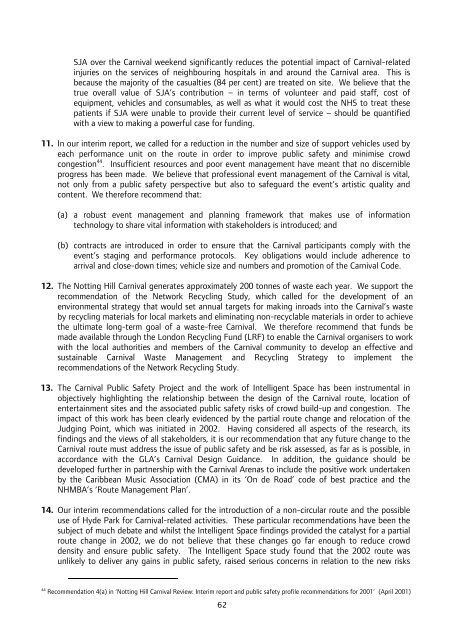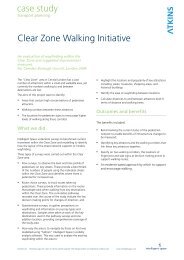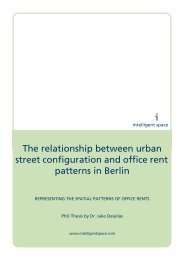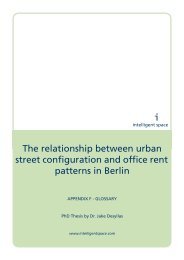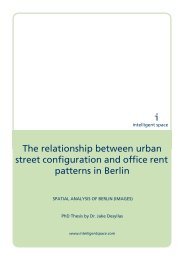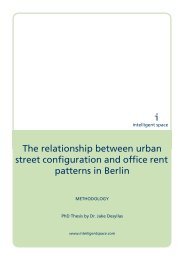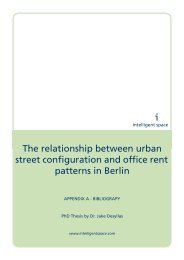Notting Hill Carnival Strategic Review - Intelligent Space
Notting Hill Carnival Strategic Review - Intelligent Space
Notting Hill Carnival Strategic Review - Intelligent Space
You also want an ePaper? Increase the reach of your titles
YUMPU automatically turns print PDFs into web optimized ePapers that Google loves.
SJA over the <strong>Carnival</strong> weekend significantly reduces the potential impact of <strong>Carnival</strong>-related<br />
injuries on the services of neighbouring hospitals in and around the <strong>Carnival</strong> area. This is<br />
because the majority of the casualties (84 per cent) are treated on site. We believe that the<br />
true overall value of SJA’s contribution – in terms of volunteer and paid staff, cost of<br />
equipment, vehicles and consumables, as well as what it would cost the NHS to treat these<br />
patients if SJA were unable to provide their current level of service – should be quantified<br />
with a view to making a powerful case for funding.<br />
11. In our interim report, we called for a reduction in the number and size of support vehicles used by<br />
each performance unit on the route in order to improve public safety and minimise crowd<br />
congestion 44 . Insufficient resources and poor event management have meant that no discernible<br />
progress has been made. We believe that professional event management of the <strong>Carnival</strong> is vital,<br />
not only from a public safety perspective but also to safeguard the event’s artistic quality and<br />
content. We therefore recommend that:<br />
(a) a robust event management and planning framework that makes use of information<br />
technology to share vital information with stakeholders is introduced; and<br />
(b) contracts are introduced in order to ensure that the <strong>Carnival</strong> participants comply with the<br />
event’s staging and performance protocols. Key obligations would include adherence to<br />
arrival and close-down times; vehicle size and numbers and promotion of the <strong>Carnival</strong> Code.<br />
12. The <strong>Notting</strong> <strong>Hill</strong> <strong>Carnival</strong> generates approximately 200 tonnes of waste each year. We support the<br />
recommendation of the Network Recycling Study, which called for the development of an<br />
environmental strategy that would set annual targets for making inroads into the <strong>Carnival</strong>’s waste<br />
by recycling materials for local markets and eliminating non-recyclable materials in order to achieve<br />
the ultimate long-term goal of a waste-free <strong>Carnival</strong>. We therefore recommend that funds be<br />
made available through the London Recycling Fund (LRF) to enable the <strong>Carnival</strong> organisers to work<br />
with the local authorities and members of the <strong>Carnival</strong> community to develop an effective and<br />
sustainable <strong>Carnival</strong> Waste Management and Recycling Strategy to implement the<br />
recommendations of the Network Recycling Study.<br />
13. The <strong>Carnival</strong> Public Safety Project and the work of <strong>Intelligent</strong> <strong>Space</strong> has been instrumental in<br />
objectively highlighting the relationship between the design of the <strong>Carnival</strong> route, location of<br />
entertainment sites and the associated public safety risks of crowd build-up and congestion. The<br />
impact of this work has been clearly evidenced by the partial route change and relocation of the<br />
Judging Point, which was initiated in 2002. Having considered all aspects of the research, its<br />
findings and the views of all stakeholders, it is our recommendation that any future change to the<br />
<strong>Carnival</strong> route must address the issue of public safety and be risk assessed, as far as is possible, in<br />
accordance with the GLA’s <strong>Carnival</strong> Design Guidance. In addition, the guidance should be<br />
developed further in partnership with the <strong>Carnival</strong> Arenas to include the positive work undertaken<br />
by the Caribbean Music Association (CMA) in its ‘On de Road’ code of best practice and the<br />
NHMBA’s ‘Route Management Plan’.<br />
14. Our interim recommendations called for the introduction of a non-circular route and the possible<br />
use of Hyde Park for <strong>Carnival</strong>-related activities. These particular recommendations have been the<br />
subject of much debate and whilst the <strong>Intelligent</strong> <strong>Space</strong> findings provided the catalyst for a partial<br />
route change in 2002, we do not believe that these changes go far enough to reduce crowd<br />
density and ensure public safety. The <strong>Intelligent</strong> <strong>Space</strong> study found that the 2002 route was<br />
unlikely to deliver any gains in public safety, raised serious concerns in relation to the new risks<br />
44<br />
Recommendation 4(a) in ‘<strong>Notting</strong> <strong>Hill</strong> <strong>Carnival</strong> <strong>Review</strong>: Interim report and public safety profile recommendations for 2001’ (April 2001)<br />
62


